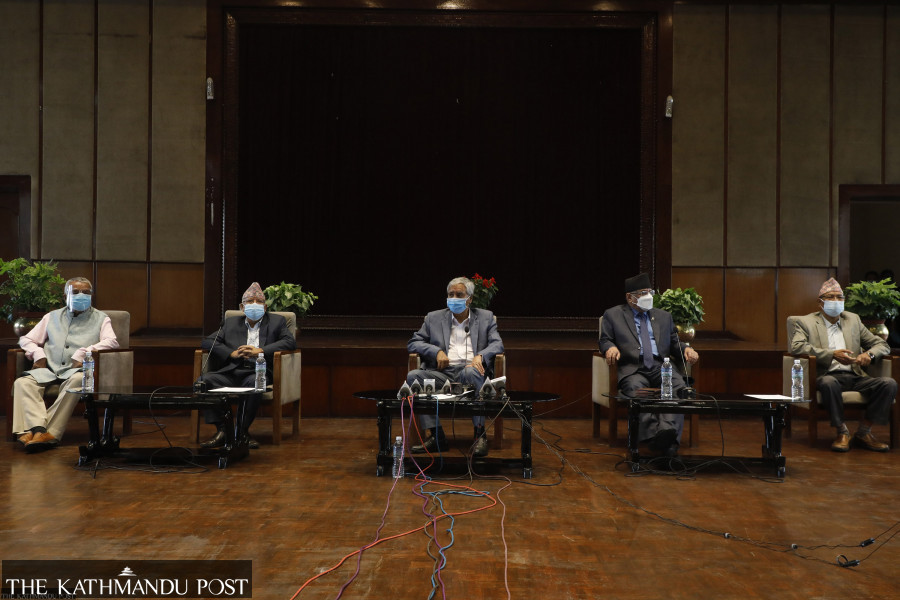National
Ruling coalition to meet before all-party meeting called by prime minister
MCC, House obstruction among the agenda. The UML has said it won’t participate in the all-party meeting.
Post Report
The ruling coalition is holding a meeting later on Sunday afternoon.
The meeting is being held before an all-party meeting called by Prime Minister Sher Bahadur Deuba.
A leader said ruling coalition partners—Nepali Congress, the Communist Party of Nepal (Maoist Centre), CPN (Unified Socialist), Janata Samajbadi Party and Rastriya Janamorcha—will hold a meeting at 2pm Sunday.
Deuba has called an all-party meeting at 4pm.
The leader said contemporary politics, the ongoing House obstruction by the main opposition CPN-UML and the Millennium Challenge Corporation, among others, will be discussed during the ruling coalition meeting.
The same issues are also high on the agenda of the all-party meeting.
“A host of issues, including House obstruction, the MCC and bills pending in Parliament, are some of the issues that the prime minister wants to discuss during the all-party meeting,” Bal Krishna Khand, minister for home affairs, told the Post on Saturday.
The meetings come amid the government preparation to table the MCC, under which Nepal will receive $500 million in grants from the United States, in Parliament.
The MCC Nepal Compact, registered in Parliament in July 2019, has emerged as a controversial issue in Nepal, with the partners in the ruling coalition objecting to its parliamentary ratification in its current form.
Deuba’s coalition partners have been demanding amendments to some clauses of the agreement. Those objecting to the MCC say some of its clauses undermine Nepal’s sovereignty, a claim flatly denied by the MCC headquarters and the American embassy in Kathmandu.
MCC Board of Directors on December 14 held a meeting where the MCC Nepal Compact was one of the agendas.
“MCC Board of Directors received an update and discussed the progress to date of the $500 million Nepal Compact,” the MCC headquarters said in a statement on December 18. “The Board of Directors made note of the commitment by the government of Nepal to seek to ratify the compact in the near term.”
Deuba has invited all the parties represented in the Parliament for the 4pm meeting, but the main opposition UML has said it won’t attend.
“There’s no point in attending the meeting which has been called just for formality,” a senior UML leader told the Post on Saturday.
For Deuba, while the MCC’s parliamentary ratification has emerged as a pressing issue, he also needs to figure out a way to break the deadlock in the House.
The UML has vowed not to let the House function in protest against Speaker Agni Sapkota for his non-action on the party's decision to expel as many as 14 of its lawmakers, including Madhav Kumar Nepal.
Nepal later split from the UML and formed a new party—the CPN (Unified Socialist).
The UML has also filed a petition at the Supreme Court against the Speaker’s refusal to act on the party decision and against the Election Commission for registering a new party under Nepal.
The UML was ready to endorse the MCC when it was in power, but it has changed its stance since its chair KP Sharma Oli was thrown out of office as prime minister.
When the MCC Nepal Compact was registered in Parliament, the Nepal Communist Party (NCP), formed after a merger between the UML and the Maoist Centre, was in power. The US grant agreement had become a divisive force in the NCP. The unified communist party was invalidated by the Supreme Court in March this year and both the constituents were reinstated in their pre-May 2018 stage.
Now the Maoist Centre is supporting the Deuba government, just like in September 2017 when the MCC Nepal Compact was signed.
The American grant is likely to charge up Nepali politics once again amid Deuba’s insistence on pushing it for parliamentary ratification amid reservations from his coalition partners.




 8.67°C Kathmandu
8.67°C Kathmandu














